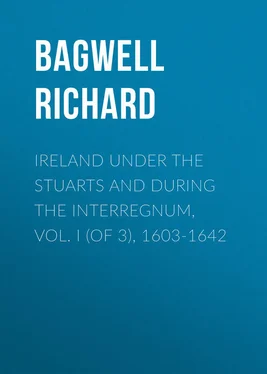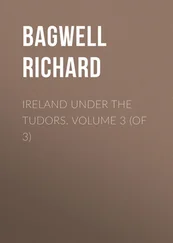Richard Bagwell - Ireland under the Stuarts and during the Interregnum, Vol. I (of 3), 1603-1642
Здесь есть возможность читать онлайн «Richard Bagwell - Ireland under the Stuarts and during the Interregnum, Vol. I (of 3), 1603-1642» — ознакомительный отрывок электронной книги совершенно бесплатно, а после прочтения отрывка купить полную версию. В некоторых случаях можно слушать аудио, скачать через торрент в формате fb2 и присутствует краткое содержание. Жанр: foreign_antique, foreign_prose, на английском языке. Описание произведения, (предисловие) а так же отзывы посетителей доступны на портале библиотеки ЛибКат.
- Название:Ireland under the Stuarts and during the Interregnum, Vol. I (of 3), 1603-1642
- Автор:
- Жанр:
- Год:неизвестен
- ISBN:нет данных
- Рейтинг книги:4 / 5. Голосов: 1
-
Избранное:Добавить в избранное
- Отзывы:
-
Ваша оценка:
- 80
- 1
- 2
- 3
- 4
- 5
Ireland under the Stuarts and during the Interregnum, Vol. I (of 3), 1603-1642: краткое содержание, описание и аннотация
Предлагаем к чтению аннотацию, описание, краткое содержание или предисловие (зависит от того, что написал сам автор книги «Ireland under the Stuarts and during the Interregnum, Vol. I (of 3), 1603-1642»). Если вы не нашли необходимую информацию о книге — напишите в комментариях, мы постараемся отыскать её.
Ireland under the Stuarts and during the Interregnum, Vol. I (of 3), 1603-1642 — читать онлайн ознакомительный отрывок
Ниже представлен текст книги, разбитый по страницам. Система сохранения места последней прочитанной страницы, позволяет с удобством читать онлайн бесплатно книгу «Ireland under the Stuarts and during the Interregnum, Vol. I (of 3), 1603-1642», без необходимости каждый раз заново искать на чём Вы остановились. Поставьте закладку, и сможете в любой момент перейти на страницу, на которой закончили чтение.
Интервал:
Закладка:
While at Louvain, and no doubt by way of answer to the royal declaration, both Tyrone and Tyrconnel caused expositions of their grievances to be drawn up, and these documents are still preserved in London, but do not appear to have been ever transmitted to the Irish Government. No rejoinder to them or criticism of them is known to exist, and they must be taken for what they are worth as ex parte statements. Religion is placed in the forefront of both manifestoes, in general terms by Tyrconnel, but more specifically by Tyrone, the proclamation of July 1605 having been promulgated by authority in his manor of Dungannon.
But the case for the Earls mainly consists in an enumeration of their difficulties with the Irish Government officials, and it may well be believed that many underlings exercised their powers harshly and corruptly. What appears most clearly is that the local domination of an O’Neill or an O’Donnell, even though they wore earls’ coronets, was inconsistent with the modern spirit. They found the position of subjects intolerable. By their flight they hastened the progress of events, but their stay in Ireland could not very long have retarded it. 43 43 Cal. of State Papers, Ireland , 1607, Nos. 501 and 503; James Bathe to Salisbury, January 9, 1607-8.
Tyrone and the rest left Louvain on February 17, the Spanish authorities having with much difficulty and delay found money enough to speed the parting guests. Edmondes wrote to Charles of Lorraine reminding him of his near relationship to the King of England and also of the fact that ‘these fugitives and rebels had found the door shut in Spain, where the King would not admit them out of respect and friendship to King James.’ The Duke let them pass through his country, and afterwards appeared to have been greatly impressed in their favour, as such a champion of the Roman Church would naturally be. Their expenses were paid by him while in Lorraine, and he entertained them sumptuously in his palace at Nancy. They travelled by Basel and Lucerne to the St. Gothard, and one of O’Donnell’s sumpter horses fell over the Devil’s Bridge and was lost, with a large sum of money. The monks received them at the hospice, and on their descent into Italy they were well received at Faido, Bellinzona, and Como. Fuentes, the Governor of Milan, went out to meet them with his staff. They were lodged at the hostelry of the Three Kings and handsomely entertained there at the governor’s expense. Cornwallis at Madrid and Wotton at Venice complained loudly, and received soft answers. Salisbury told Cornwallis to make little of the fugitive Earls and to describe them as mere earthworms; and the ambassador bettered the instruction by saying that he esteemed them and all their company as so many fleas. The Spanish officials replied that Fuentes was generally hospitable to strangers, but that the King’s government had no idea of countenancing the exiles.
Wotton easily persuaded the anti-Romanist and lately excommunicated Doge to exclude the Irish party from Venetian territory, and a person in his confidence followed Tyrone privately wherever he went. The exiles received 1,000 crowns from Fuentes, of which they complained as much below their expectations. They were well received at Parma and Reggio, and reached papal territory at Bologna, where Cardinal Barberini, afterwards Urban VIII., was then governor. From Ancona they made a pilgrimage to Loretto, and travelling by Foligno, Assisi and Narni, they came in sight of Rome on April 29. Several cardinals, in much state and with great retinues, went out to meet them at the Milvian bridge. One coach, which, according to Wotton’s informant, was borrowed by Parsons, contained Englishmen, and others came to see Tyrone inside the city. The Salviati palace in the Borgo was assigned to the exiles as a residence by Paul V. After this Tyrone sometimes showed himself in a coach with Tyrconnel and Peter Lombard the titular Primate of Ireland, who had never seen his see. 44 44 Edmondes to the Duke of Lorraine, January 12, 1607-8; to Salisbury, January 28, February 18 and March 30; Wotton’s letters for April and May, 1608; information in Wotton’s hand, No. 897, State Papers, Ireland ; Meehan , chap. 7, with the Doge Donato’s letter at p. 270; Salisbury to Cornwallis, September 27, 1607, in Winwood’s Memorials , and Cornwallis to the Privy Council, April 19, 1608, ib.
‘I know not,’ said Chichester, ‘what aid or supportation the fugitives shall receive from the Spaniard or Archduke, but the kind entertainment they have received compared with the multitude of pensions given to base and discontented men of this nation, makes them there and their associates and well wishers here to give out largely, and all wise and good subjects to conceive the worst. I am many ways assured that Tyrone and Tyrconnel will return if they live, albeit they should have no other assistance nor supportation than a quantity of money, arms, and munition, with which they will be sufficiently enabled to kindle such a fire here (where so many hearts and actors affect and attend alteration) as will take up much time with expense of men and treasure to quench it.’ These rumours continued while Tyrone lived, and after his death his son was expected. Exiles are generally sanguine, and the friars and Jesuits kept up constant communication with Spain and the Netherlands; but the decadent Spanish monarchy could never make an attempt on Ireland or give any serious trouble until England was at war with herself. 45 45 Chichester to Northampton, February 7, 1607-8, printed in Ulster Journal of Archæology , i. 180, from Cotton MS. Tit. B. x. 189.
CHAPTER IV
REBELLION OF O’DOGHERTY, 1608
The wild territory of Inishowen between Lough Foyle and Lough Swilly had been for ages in possession of the O’Dogherty clan, who were, however, not quite independent either of O’Neill or O’Donnell. Sir John O’Dogherty, who held Inishowen by patent, died in December 1600, and Hugh Roe O’Donnell set up his brother Phelim in his stead, to the exclusion of his son Cahir, whom he kept in his own power. Cahir’s foster-brethren, the MacDavitts, appealed to Sir Henry Docwra, and he persuaded O’Donnell to release the young man, whom the Government then adopted as chief. After the accession of James, though not with Devonshire’s good will, Sir Cahir, who had been knighted for good service in the field, was confirmed by the King in his father’s possessions. The island of Inch was leased to another, but after Devonshire’s death the King agreed to restore it. Tyrconnel complained bitterly that Inishowen was excepted from his grant, and Tyrone grumbled at losing an annual rent of sixty cows out of it, ‘never before your Majesty’s reign brought to any question.’ Docwra was Sir Cahir’s steady friend, but Devonshire’s extreme leaning to Tyrone’s side made his position intolerable, and he left Ireland in 1606, having sold his land at Derry to George Paulet, the Marquis of Winchester’s son. He was allowed to compound with Paulet for his company of foot and the vice-provostship of Derry, and this was done with Devonshire’s approval on the ground that there was ‘no longer use for a man of war in that place.’ The King’s letter describes Paulet as ‘of good sufficiency and of service in the wars,’ but Chichester was not of that opinion. He was established at Derry at the beginning of 1607, and was soon at daggers drawn, not only with the neighbouring Irish chiefs, but with the Protestant bishop Montgomery. At the same time he neglected, notwithstanding Chichester’s repeated warnings, to post sentries or to keep any regular look-out. His ill-temper made him disliked by his own men, and they despised him for his evident incompetence. After the flight of the Earls Sir Cahir O’Dogherty was one of the commissioners especially appointed for the government of Tyrone, Donegal, and Armagh, Paulet and Bishop Montgomery being among his colleagues. His ambition at this time was a place at Court. He excited suspicion by landing a few armed men upon Tory island, but the inhabitants seem to have consented. Sir Richard Hansard, who gave the first information, did not think that O’Dogherty meant much harm, for he never had more than seventy men, armed only those of Inishowen, and refused recruits from other districts. But Paulet took a view of the case which made his want of preparation inexcusable. He went with Captain Hart, the governor of Culmore, and others to O’Dogherty’s castle of Burt on Lough Swilly, where Lady O’Dogherty, Lord Gormanston’s sister, was living. He told O’Dogherty afterwards that he only went on a friendly visit, but to Chichester he said that he meant to seize the castle had he not found it well defended.
Читать дальшеИнтервал:
Закладка:
Похожие книги на «Ireland under the Stuarts and during the Interregnum, Vol. I (of 3), 1603-1642»
Представляем Вашему вниманию похожие книги на «Ireland under the Stuarts and during the Interregnum, Vol. I (of 3), 1603-1642» списком для выбора. Мы отобрали схожую по названию и смыслу литературу в надежде предоставить читателям больше вариантов отыскать новые, интересные, ещё непрочитанные произведения.
Обсуждение, отзывы о книге «Ireland under the Stuarts and during the Interregnum, Vol. I (of 3), 1603-1642» и просто собственные мнения читателей. Оставьте ваши комментарии, напишите, что Вы думаете о произведении, его смысле или главных героях. Укажите что конкретно понравилось, а что нет, и почему Вы так считаете.












